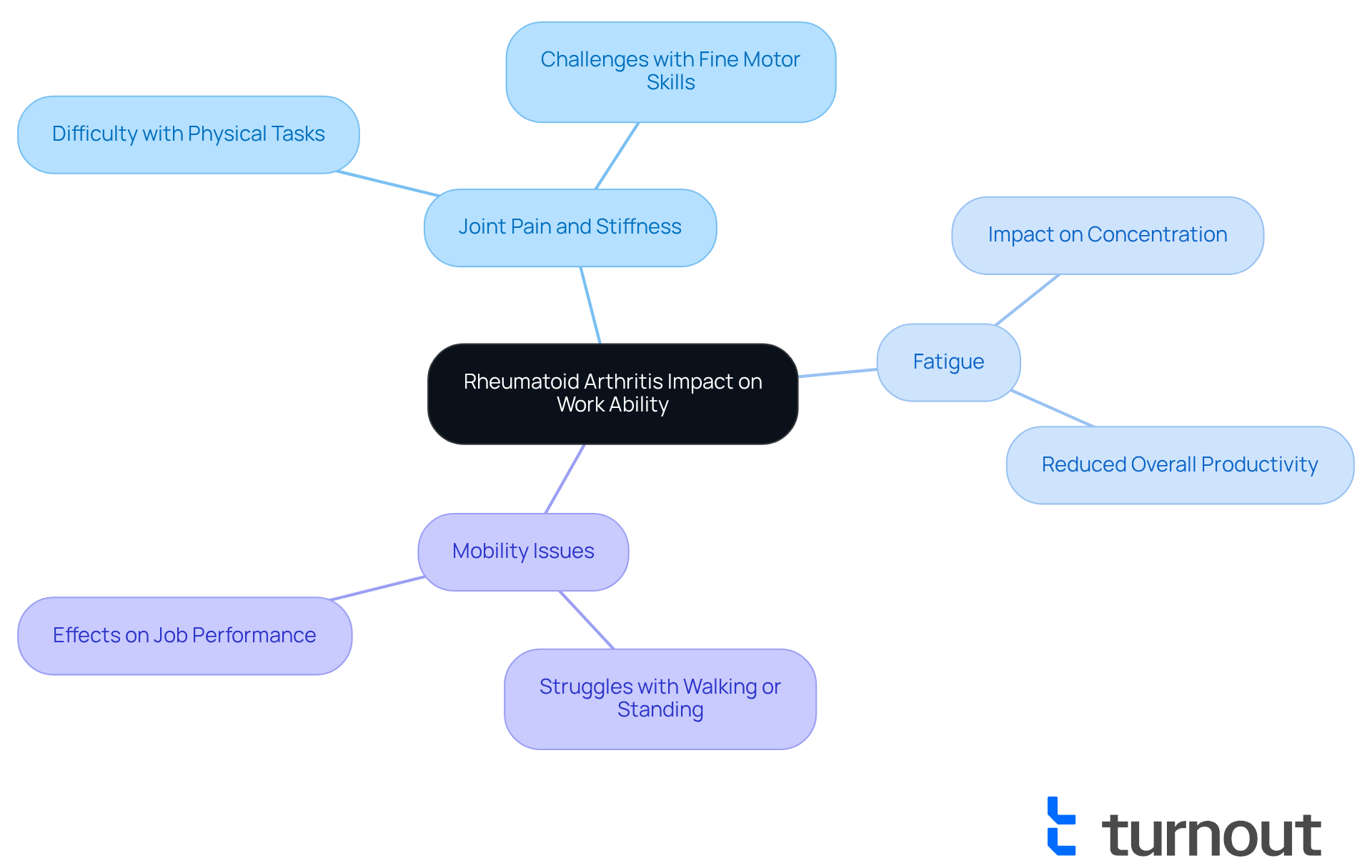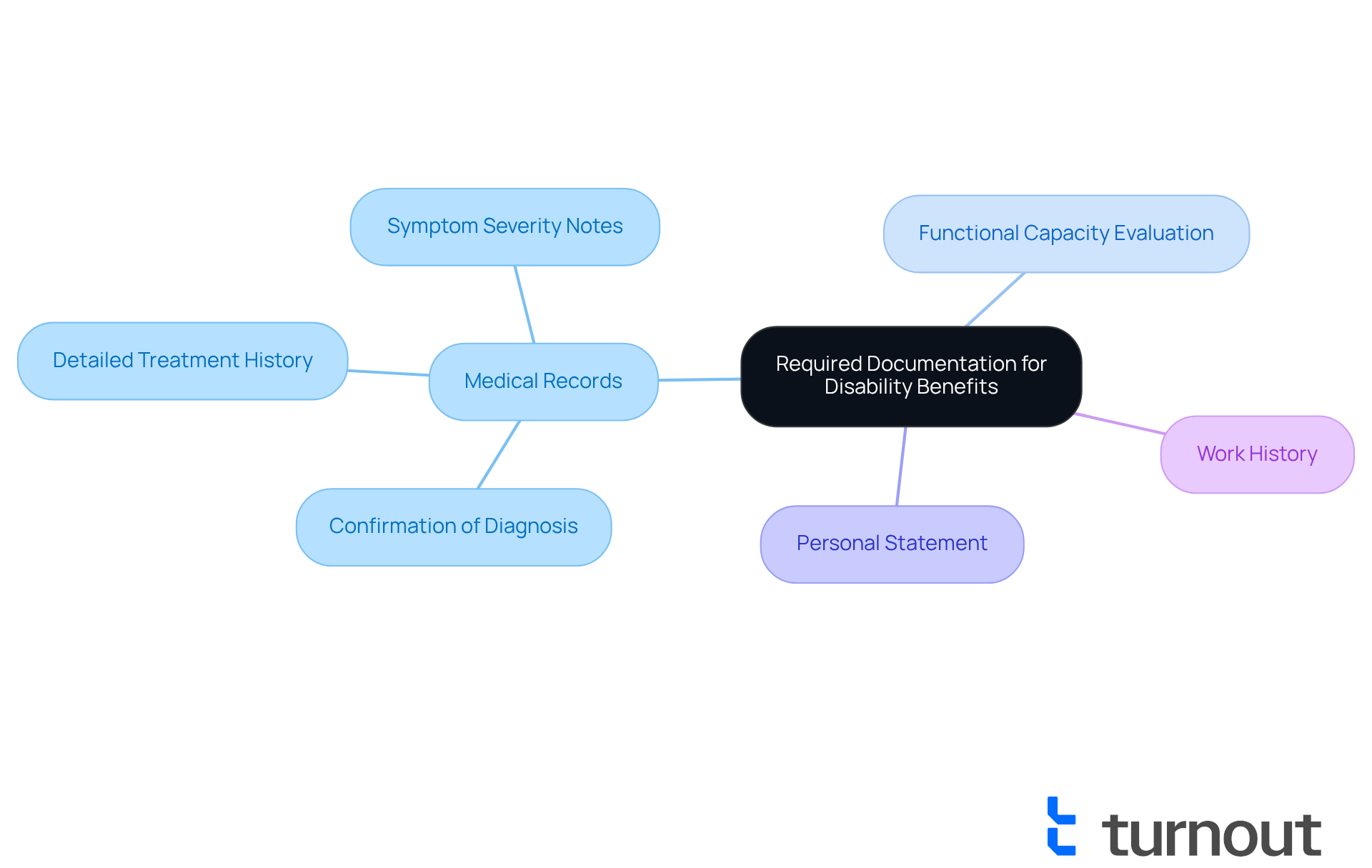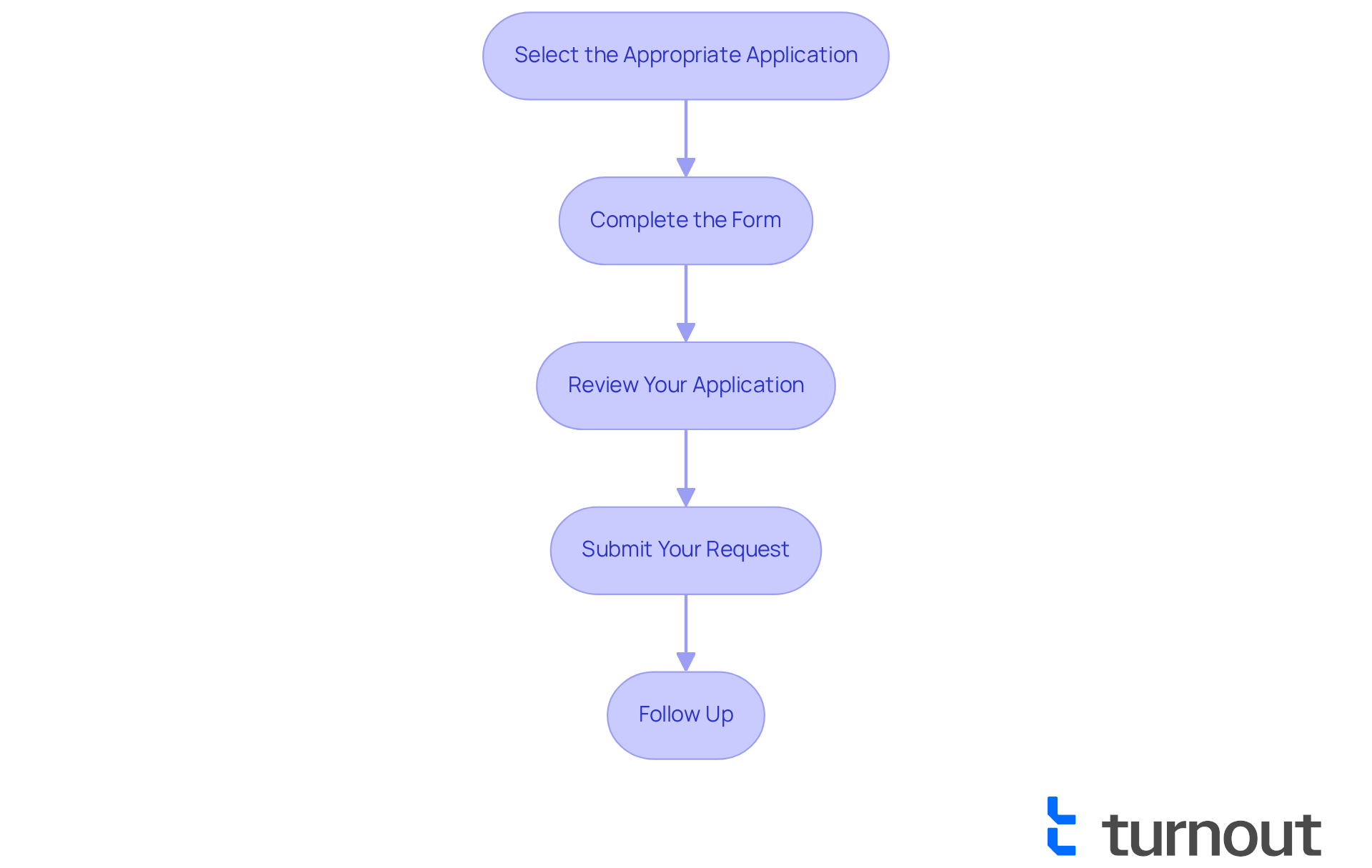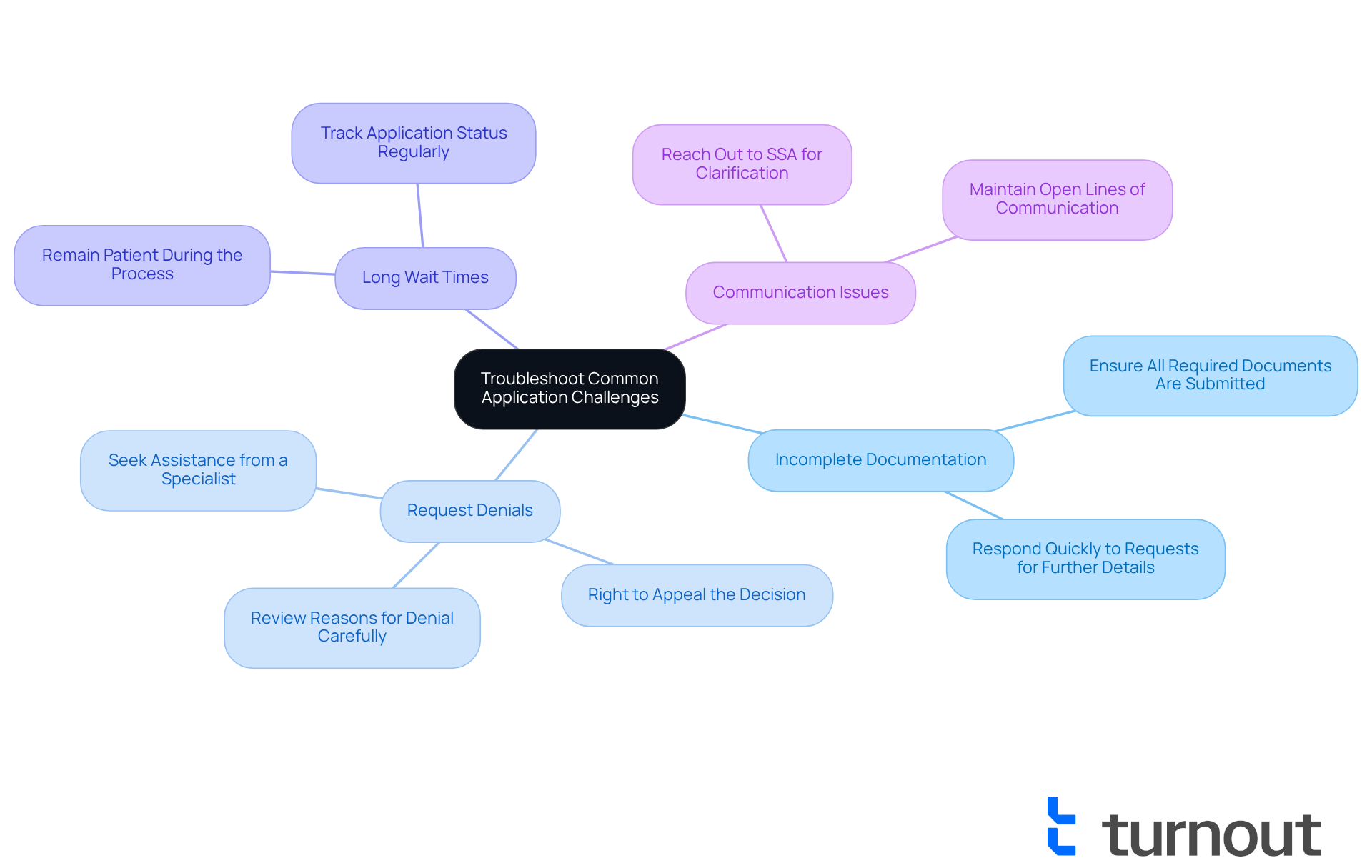Overview
This article outlines five essential steps to help you secure disability benefits if you are living with rheumatoid arthritis. We understand that navigating this process can be overwhelming, which is why it’s crucial to focus on documentation, eligibility criteria, and the application process.
The Social Security Administration has specific requirements that include medical records and details about functional limitations. Knowing these requirements can make a significant difference in your journey. It’s common to feel uncertain about how to gather this information, but we’re here to help you through it.
Additionally, this article provides guidance on how to overcome common challenges during the claims process. Remember, you are not alone in this journey, and with the right support, you can navigate these obstacles successfully.
Introduction
Rheumatoid arthritis (RA) is more than just a chronic condition; it can profoundly affect your ability to work and engage in daily activities. We understand that navigating the complex landscape of disability benefits can feel daunting. Articulating how this debilitating disease impacts your life is often overwhelming. This article offers a structured approach to help you secure the disability benefits you deserve. We will break down essential steps and provide valuable insights into eligibility criteria and documentation requirements.
But what happens when the application process becomes too much to handle, or when denials occur? It's common to feel frustrated and uncertain in these moments. Understanding how to effectively manage these challenges is crucial for anyone seeking support on their journey with rheumatoid arthritis. Remember, you are not alone in this journey; we're here to help.
Understand Rheumatoid Arthritis and Its Impact on Work Ability
Rheumatoid arthritis is a chronic inflammatory disorder that primarily affects your joints, causing pain, swelling, and stiffness. We understand that rheumatoid arthritis disability can significantly hinder your ability to perform daily tasks and maintain your job. Many individuals with RA face common challenges, including:
- Joint Pain and Stiffness: This can make it difficult to carry out physical tasks, especially those requiring fine motor skills.
- Fatigue: Chronic fatigue is a frequent experience for many, impacting concentration and overall productivity.
- Mobility Issues: In severe cases, walking or standing for extended periods can become a struggle, which affects job performance.
Grasping these effects is essential when expressing your circumstances while seeking assistance for rheumatoid arthritis disability. The Social Security Administration (SSA) evaluates how your rheumatoid arthritis disability affects your capacity to work. Turnout offers various tools and services designed to support you in navigating the complexities of SSD claims and financial assistance. This includes help from trained nonlawyer advocates, who can assist you in effectively communicating the challenges posed by rheumatoid arthritis. Remember, while Turnout provides this valuable assistance, they do not offer legal advocacy. This allows you to focus on your well-being and recovery as you pursue the advantages you deserve. You are not alone in this journey, and we’re here to help.

Determine Eligibility for Disability Benefits
If you’re seeking assistance due to rheumatoid arthritis, it’s important to understand what the SSA requires. We know this can be a challenging journey, and we’re here to help you navigate it. Here are some key factors to consider:
- Medical Documentation: A confirmed diagnosis of RA from a qualified healthcare provider is essential. This includes thorough medical records that detail the severity of your condition.
- Functional Limitations: The SSA looks at how your RA affects your ability to perform work-related activities. This means evaluating your capacity to stand, walk, lift, and carry.
- Employment History: Your previous job experience and the nature of your position are also considered. If your condition prevents you from fulfilling your former role or any other tasks, you could be eligible for assistance.
Turnout offers valuable support in navigating the SSD claims process. Our trained nonlawyer advocates are here to help you understand and meet these criteria. They possess a wealth of knowledge about the SSD process and can guide you through each necessary step. We encourage you to review the SSA's Blue Book, particularly the section on musculoskeletal disorders, to gain insight into the specific listings related to RA. Remember, you are not alone in this journey, and we are here to support you every step of the way.
Collect Required Documentation for Your Application
When applying for disability benefits, we understand that gathering and submitting the right documents can feel overwhelming. It's crucial to support your claim with the appropriate information. Here’s a helpful checklist of essential items:
-
Medical Records: Secure comprehensive medical records from your healthcare provider. These should include:
- Confirmation of diagnosis
- Detailed treatment history
- Notes on the severity of your symptoms
-
Functional Capacity Evaluation: If available, include assessments that illustrate how rheumatoid arthritis (RA) affects your daily activities and work capabilities.
-
Personal Statement: Craft a personal statement that outlines how your rheumatoid arthritis disability impacts your life. Be specific about the limitations you face in your daily routine and work tasks. Providing concrete examples can help illustrate your challenges.
-
Work History: Document your employment history, including job descriptions and any accommodations made due to your condition.
Ensure all documents are current and accurately represent your present health condition. This will enhance your submission and improve your chances of success. Remember, Turnout's trained nonlawyer advocates are here to assist you in navigating the SSD claims process, ensuring that your documentation is thorough and complete. It's important to note that Turnout is not a law firm and does not provide legal representation.
Statistics show that frequent documentation problems can lead to delays in claims processing. Therefore, careful preparation is essential for a successful submission. You are not alone in this journey; we’re here to help you every step of the way.

Complete and Submit Your Disability Benefits Application
Once you have gathered all necessary documentation, we understand that navigating the application process can feel overwhelming. Follow these steps to complete and submit your application with confidence:
- Select the Appropriate Application: Depending on your employment history, you may need to apply for Social Security Disability Insurance (SSDI) or Supplemental Security Income (SSI). We’re here to help you determine the best option for your situation.
- Complete the Form: Take your time to carefully fill out the form, ensuring that all information is precise and aligns with your documentation. Pay special attention to:
- Personal information
- Medical history
- Work history
- Review Your Application: It’s common to feel anxious about making mistakes. Double-check for any errors or missing information, and consider having someone else review it as well. Common pitfalls include inaccuracies in medical history and work history, which can significantly delay processing.
- Submit Your Request: You can submit your request online through the SSA website, by mail, or in person at your local SSA office. Remember to keep copies of everything you submit. Recent improvements in customer service have made online submissions more efficient, enhancing your experience.
- Follow Up: After submission, keep an eye on the progress of your request. You may receive requests for additional information, so be prepared to respond promptly. Statistics show that timely follow-ups can lead to faster resolutions, as the Social Security Administration is increasingly focused on improving customer interactions across all platforms. Remember, you are not alone in this journey; we are here to support you every step of the way.

Troubleshoot Common Application Challenges
Navigating the disability benefits request process can be challenging, especially for individuals with rheumatoid arthritis. We understand that this journey can feel overwhelming, but there are common issues and strategies to help you along the way.
- Incomplete Documentation: It's crucial to ensure that all required documents are submitted. If you receive a request for further details, please reply quickly to prevent delays in processing your submission.
- Request Denials: If your request is denied, take a moment to carefully review the reasons provided. Remember, you have the right to appeal the decision. Seeking assistance from a specialist in disability claims can significantly improve your chances of success. Many applicants with rheumatoid arthritis experience denial rates that underscore the importance of thorough documentation and clear communication about how their condition impacts daily life and work ability.
- Long Wait Times: The procedure can take several months, often leading to frustration. It’s essential to remain patient and keep track of your application status online or by contacting the Social Security Administration (SSA) directly.
- Communication Issues: If you have questions or concerns, don’t hesitate to reach out to the SSA for clarification. Maintaining open lines of communication can help resolve issues more efficiently and ensure that your case is handled appropriately.
When appealing a denial, it’s crucial to gather specific evidence that illustrates the limitations caused by rheumatoid arthritis disability. This includes detailed medical reports that document functional limitations, symptoms, and treatment responses. For instance, maintaining a log of daily activities can provide concrete examples of how your condition affects your life, which can be invaluable during the appeals process.
By addressing these common challenges proactively, you can enhance your chances of securing the disability benefits you deserve. Remember, you are not alone in this journey; we’re here to help.

Conclusion
Rheumatoid arthritis can profoundly impact your ability to work and perform daily tasks. For many, pursuing disability benefits is a critical step in this journey. We understand that navigating the complexities of the Social Security Administration's requirements and the necessary documentation can be overwhelming. By following the outlined steps, you can enhance your chances of securing the benefits you deserve.
This article highlights the importance of thorough medical documentation and a clear understanding of eligibility criteria. It addresses common challenges applicants face, such as incomplete documentation and the potential for denial, while offering strategies to overcome these hurdles. With the support of trained nonlawyer advocates, you can receive guidance tailored to your unique situation, ensuring you are well-prepared throughout the application process.
Ultimately, securing disability benefits for rheumatoid arthritis is not just about financial assistance; it’s about reclaiming a sense of stability and support during a difficult time. By proactively addressing potential challenges and leveraging available resources, you can navigate the disability benefits landscape with confidence. Taking these steps is crucial for those affected by rheumatoid arthritis to ensure your voice is heard and your needs are met.
Frequently Asked Questions
What is rheumatoid arthritis and how does it affect work ability?
Rheumatoid arthritis is a chronic inflammatory disorder that primarily affects the joints, causing pain, swelling, and stiffness. It can significantly hinder daily tasks and job performance due to joint pain, fatigue, and mobility issues.
What challenges do individuals with rheumatoid arthritis face at work?
Individuals with rheumatoid arthritis often experience joint pain and stiffness, chronic fatigue, and mobility issues, which can make physical tasks, concentrating, and standing or walking for extended periods difficult.
How does the Social Security Administration (SSA) evaluate rheumatoid arthritis disability?
The SSA assesses how rheumatoid arthritis affects an individual's capacity to work by considering medical documentation, functional limitations, and employment history.
What medical documentation is required to apply for disability benefits due to rheumatoid arthritis?
A confirmed diagnosis of rheumatoid arthritis from a qualified healthcare provider is essential, along with thorough medical records detailing the severity of the condition.
What functional limitations does the SSA consider for disability claims related to rheumatoid arthritis?
The SSA evaluates how rheumatoid arthritis impacts the ability to perform work-related activities, such as standing, walking, lifting, and carrying.
How can Turnout assist individuals seeking disability benefits for rheumatoid arthritis?
Turnout offers support through trained nonlawyer advocates who help individuals understand and navigate the SSD claims process, ensuring they meet the necessary criteria.
Where can I find more information about the SSA's requirements for rheumatoid arthritis disability claims?
You can review the SSA's Blue Book, particularly the section on musculoskeletal disorders, to gain insight into the specific listings related to rheumatoid arthritis.




